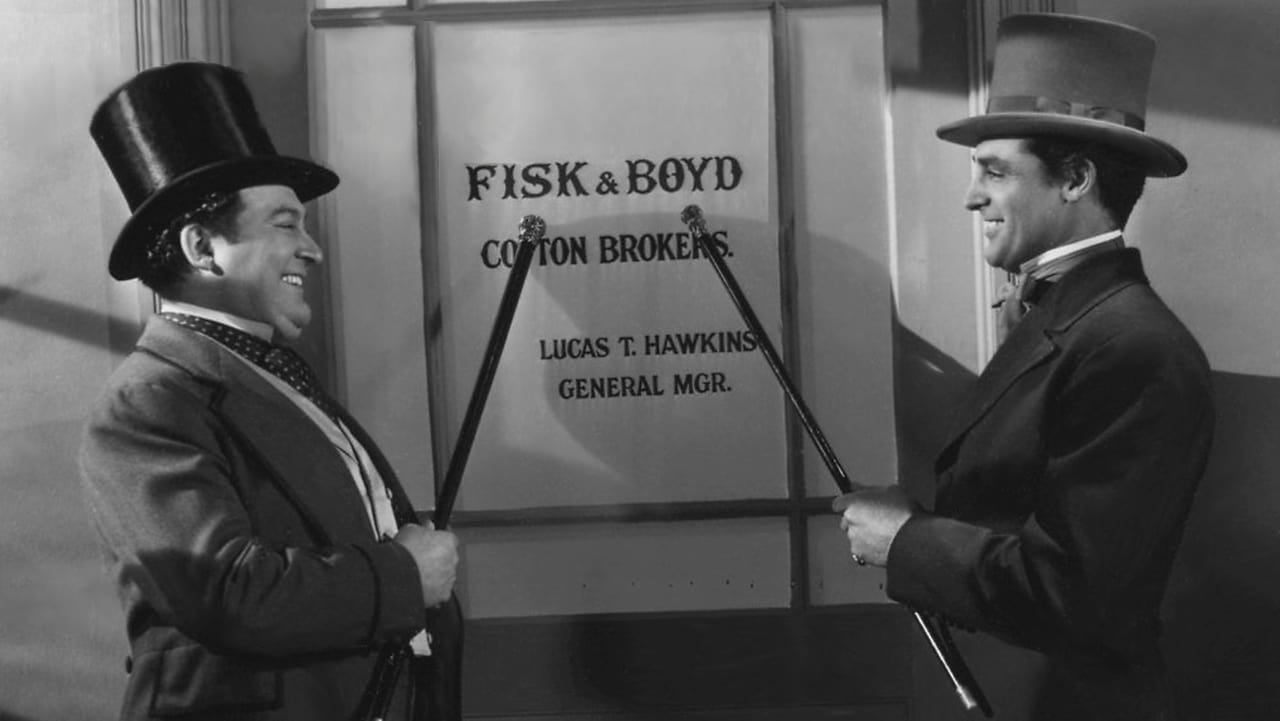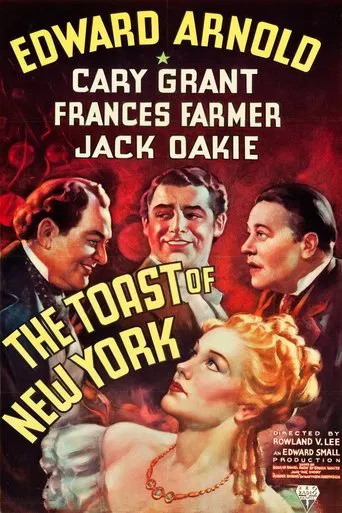

THE TOAST OF NEW YORK (RKO Radio, 1937), an Edward Small Production, directed by Rowland V. Lee, stars Edward Arnold in a fictional account of the rise and fall of Wall Street financier, James "Jim" Fisk Jr. (1934-1872). Having already starred as multi-millionaire, "Diamond Jim" Brady in DIAMOND JIM (Universal, 1935), it seemed natural for Arnold to pursue another biographical story centering upon the life of another famous man called "Jim." While Jim Fisk isn't as better known as Diamond Jim Brady, it does leave one to ask, "Who is Jim Fisk?" Based on "The Book of Daniel Drew" by Bouck White, and the story "Robber Barons" by Matthew Josephson, the opening passage offers an brief explanation to whom Jim Fisk is: "Jim Fisk - half genius, half clown - began life with empty pockets, a pack on his back, and a Yankee gift of gab. Loving a uniform - always in front of every parade - he became the Barnum of peddlers and then skyrocketed into high finance in Wall Street where in a few brief years he started a Nation with his colorful career, but in 1861 - before the first guns of the Civil War were fired - he was still an obscure peddler - somewhere South of the Mason & Dixon line." Set during a span of ten years, the plot opens in 1861 where Jim Fisk (Edward Arnold), a medicine show impresario assisted by Nick Boyd (Cary Grant) and Luke (Jack Oakie), get chased out of town by an angry mob after being exposed as fakes. Once passing the boarder onto the next state, Jim next get-rich-quick scheme has him sending Luke to Boston where he's to open an office while he and Nick remain behind to smuggle Southern cotton to the Northern states. At the close of the Civil War where the trio reunite, Fisk discovers Luke converted their profits into worthless Confederate bonds. Coming up with another plan to make millions, Fisk sells his business to Daniel Drew (Donald Meek), and contrives a controlling interest in the Erie Railroad. Before becoming a wealthy financial wizard of New York's stock market, he encounters Josie Mansfield (Frances Farmer), a maid working for temperamental French actress Mademoiselle Fleurigue (Thelma Leeds), and through his philosophy to "think big, talk big and be big," he arranges for the ambitious actress who becomes Jim's mistress to succeed on stage, much to the displeasure of Nick, who believes in himself Josie could become the cause of his financial ruin.With the champagne glasses and glittering lettering in the opening titles, THE TOAST OF NEW YORK appears to be an expensive lavish-scale production, and certainly is. With its large, impressive cast, THE TOAST OF NEW YORK is very much Edward Arnold's show from start to finish. Reuniting him for the second and final time with Frances Farmer (on loan from Paramount) from COME AND GET IT (Samuel Goldwyn, 1936), where her dual role characterization nearly overshadows Arnold's performance, this time it's Arnold who has the spotlight through his solid performance. Aside from appearing 22 minutes from the start of the story, Farmer's natural acting style which usually garners praise and attention spends much of her time in a Hollywood-ridden cliché pattern in a love/hate relationship with Cary Grant amounting to little challenge here. A fine performance on her part, Farmer's vocalization to the film's theme song is okay, but not as magical as her haunting rendition of "Aural Lee" from COME AND GET IT.Other worthy offering involving Farmer is the montage in segments involving her stage performance of "Twelve Temptations." Jack Oakie, always good to have around for comic relief, resumes his duties here in a some notable scenes, especially one that has Luke drilling a regiment of soldiers where everything goes comically wrong, as observed in disbelief by the Top Sergeant (Stanley Fields). Thelma Leeds as the French actress gives a performance reminiscent to Luise Rainer's Anna Held from THE GREAT ZIEGFELD (MGM, 1936), but unlike Rainer, no Academy Award nomination.During the course of 109 minutes, songs incorporated into the story include: "Opoh La La" (sung by Thelma Leeds); "The First Time I Saw You" (theme song sung by Frances Farmer); and "The Temptation Waltz." Others in the cast include Clarence Kolb (Cornelius Vanderbilt); Lionel Bellmore (President of the Board); and Mary Gordon (Mrs. Callahan). Look quickly for Hal Roach stock players of Laurel and Hardy comedies as James Finlayson and Billy Gilbert in smaller roles.As a biography, THE TOAST OF NEW YORK disappoints in accuracy. As a motion picture overall, it's quite good even with expected results. Largely overlooked and forgotten until distributed to home video in the 1980s, DVD (Turner Entertainment) and broadcasts on cable television including USA (1986-87), American Movie Classics (prior to 2000), the story and the rise to power of Jim Fisk and his relationship with Josie Mansfield can be seen occasionally on Turner Classic Movies. (***1/2)
... View MoreThe story of one of the Gilded Age's most colorful figures, the multimillionaire Jim Fisk (Edward Arnold) and two of his fictional partners, Cary Grant, who is there to wind up with the girl (Frances Farmer) and Jack Oakie, who provides whatever laughs are left over after Arnold and Grant are finished howling with glee over their own twisted schemes to make a fortune.It's a story with an ignoble message -- making scads of money by being ruthless, lying, treacherous, and philistine, is fun. Want to be happy? Keep your mind focused on being greedy. Well, it's not true. I've been ruthless, lying, treacherous, and philistine all my life and look where it's gotten me -- an abandoned railway car in the middle of the desert. Maybe I wasn't greedy enough. I've always regretted dropping that handful of pocket change into the kettle of a Santa Claus in New York. It was the tintinnabulation of his bells that got me. I've tried to make up for it by being as philistine as possible, papering my walls with Gustav Klimt posters, listening to Kenny G, but nothing works.So if you're looking for philosophical advice, you won't find it in this movie. But if you're looking for a whiz-bang biography of a couple of guys amassing a fortune and laughing all the way to the bank until one of them winds up paying the piper, this may be it.Rowland V. Lee's direction is nothing special but Edward Arnold practically embodied the sneaky rich guy of 1930s movies in such works as "Meet John Doe" and "Come And Get It." He's got the boisterous laugh of the self-satisfied, selfish, careless mogul down pat, although, to be honest, he looks like he should be running a butcher shop in Geldgierig-am-Rhein or someplace. I suppose Yorkville would do.There was a burst of interest for some reason in biographies of famous men and women in the Great Depression of the 1930s and a lot of the subjects were self-made men, inventors, financiers, and the like. Maybe, at the time, they represented wish-fulfilling fantasies on the part of the audience -- pleasant dreams with a golden cast -- which would have been a big improvement over the cadaverous green of their everyday nightmares.
... View MoreThe Toast of New York is directed by Rowland V. Lee and features a screenplay collectively written by Dudley Nichols, John Twist and Joel Sayre. It's adapted from two stories, "The Book of Daniel Drew" written by Bouck White and "Robber Barons" written by Matthew Josephson. It stars Edward Arnold, Cary Grant, Frances Farmer, Jack Oakie and Donald Meek.Jim Fisk-half genius, half clown-began life with empty pockets, a pack on his back, and a Yankee gift of gab.Loving a uniform-always in the front of every parade-he became the Barnum of Peddlers, and then skyrocketed into "high finance" in Wall Street, where in a few brief years he startled a nation with his colourful career.But in 1861-before the first guns of the Civil War were fired-he was still an obscure peddler-somewhere south of the Mason and Dixie Line.Jim Fisk was a very interesting man in the world of finance, his life and death certainly had enough about it to warrant a film being made about him. Sadly this particular biopic is dull, where even the fact that the makers fictionalised some of the plot fails to make it worthy of further viewings. Annoying as well is that RKO really put big money into the production, and you can see that up on the screen in the sets, costuming and the number of people who are in it. It was a troubled production, and numerous stars were linked to play the key roles, and with the Hays Office casting their censorship shadow over things, it's perhaps unsurprising that the film ended up a flop at the box office. The tone is uneven, with the comedy an uneasy fit, and there's not a great deal to laud in the acting. Arnold gives it bluster and Farmer is sweet, while Grant is forced into yet another suit and asked to be a romantic interest. Oakie has his moments, but they are few, while best of the bunch is Meek as Daniel Drew.Disappointing and it perhaps would have been better served being a straight drama and sniping 20 minutes off of its run time. 4/10
... View MoreHow could anyone think of placing Cary Grant in a film and giving him practically nothing to do?! Well, even though it was relatively early in his career, he had plenty of charisma and star status that it just didn't make sense having him play second to Edward Arnold--who played an annoying and ridiculous version of the life of Jim Fisk. These two characters were also teamed with Jack Oakey--who was there solely for comic relief. All together, they had very little chemistry together and the film itself was dreadfully uninteresting. In many ways it had SOME of the appearance of films such as MANHATTAN MELODRAMA or SAN FRANCISCO (all had a pretty impressive budget and sets), except these films set in roughly the same period in American history were interesting! A poorly written script, too much comic relief and a complete ignorance of the actual historical facts make this movie a real chore to sit through and one of the few in recent months that I truly couldn't stand. Even "bad" movies (such as some of the 50s sci-fi flicks) can often be enjoyed for their campiness or your ability to laugh at them--this one is just dull.My advice? See any of Cary Grant's other marvelous films--he didn't make that many as poor as this one and made so many classics that deserve your attention.
... View More